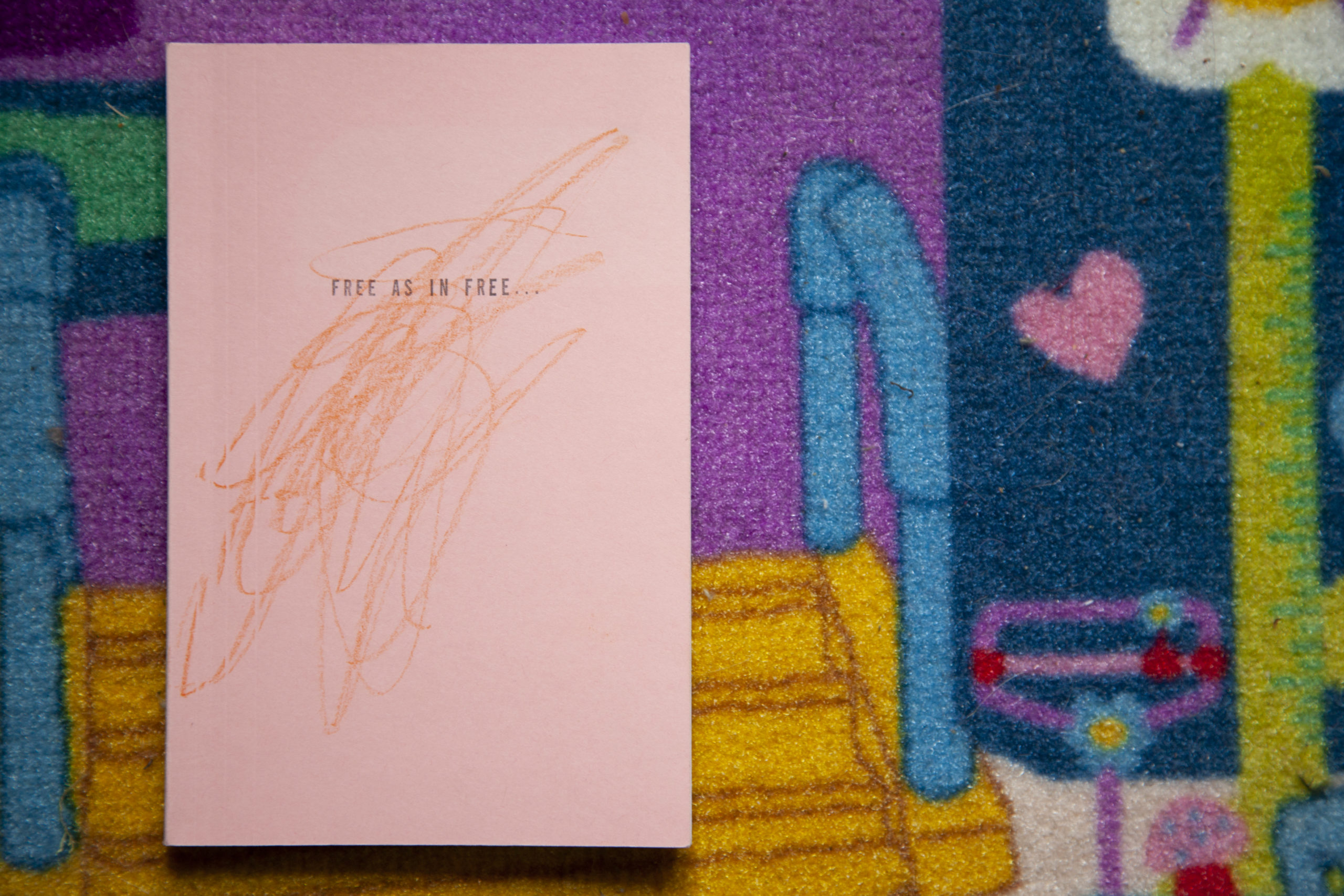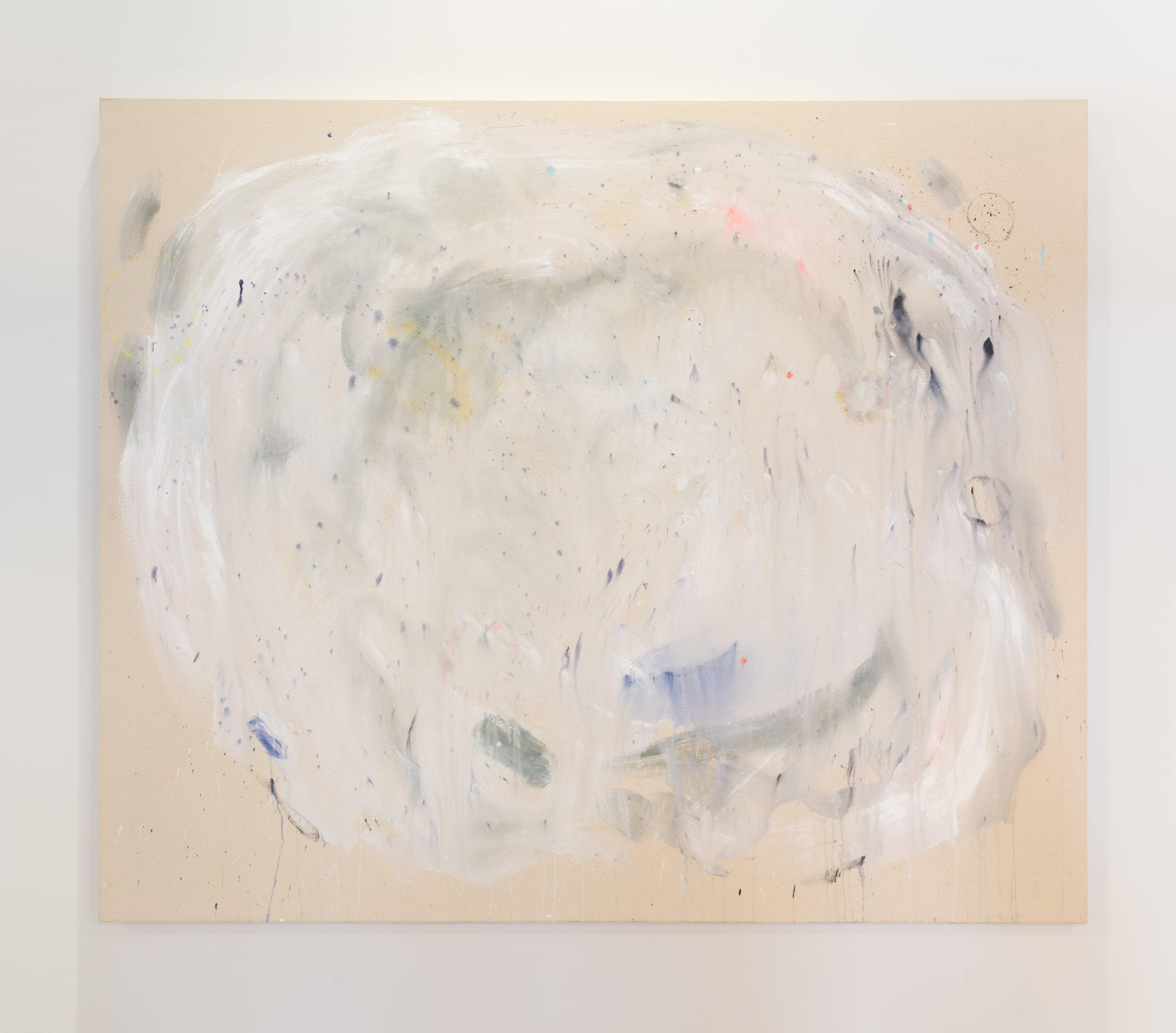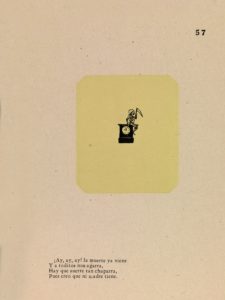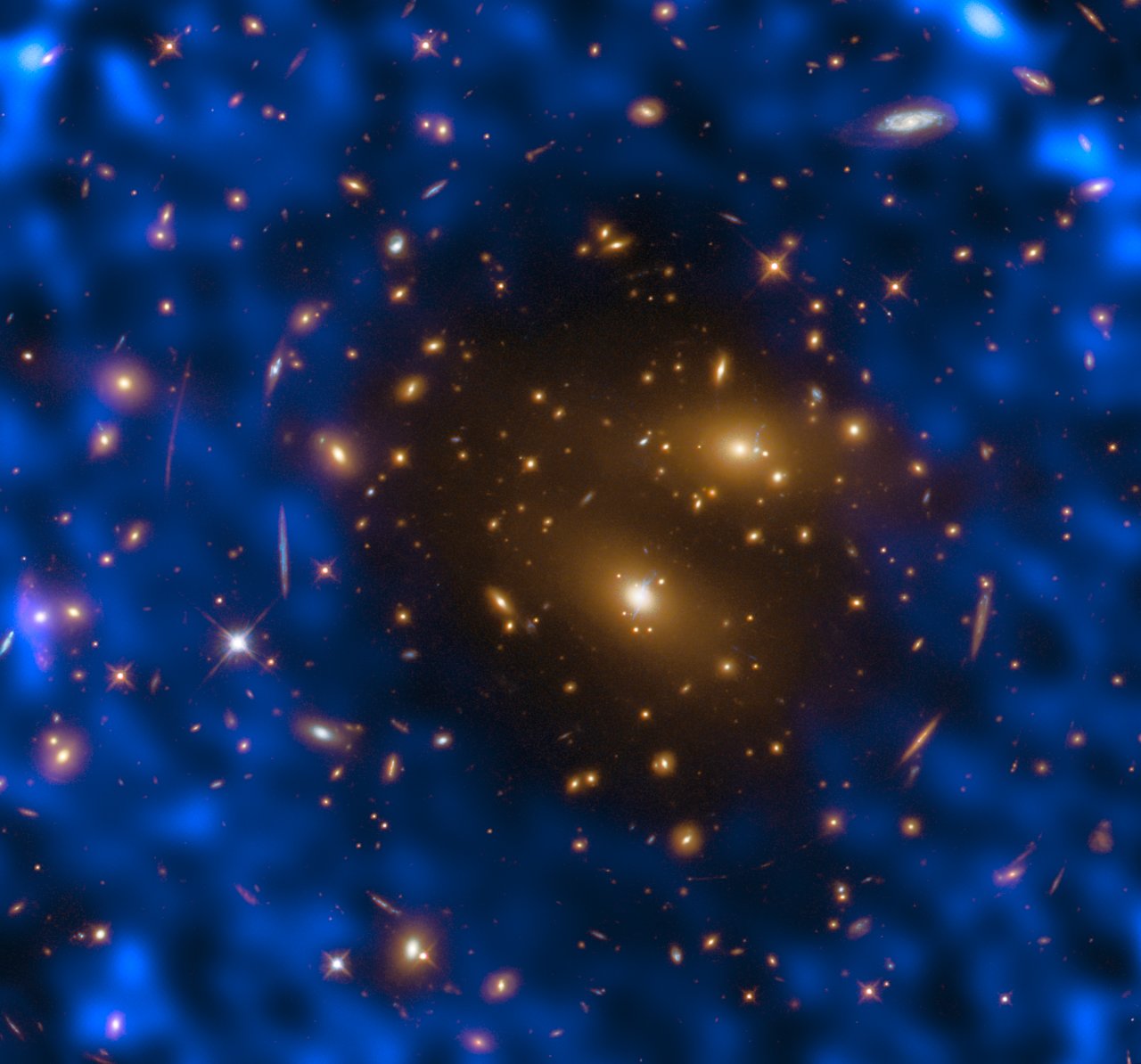The Theft of Time
Aeron Bergman and Alejandra Salinas
June 2020

Busy Bee. Bergman Salinas. Portland, April 2020
As we sit, observing the abundant early spring bloom of the undisturbed cherry tree in our backyard, reality is real. Reality is hard to believe, and yet there is evidence. Manufactured reality industries cannot generate its bullshit fast enough to keep up.
A striking fact, at home in isolation from each other, is that the most effective form of fight is rest. This is extremely so during COVID-19, but rest from manic growth will also lower C02, N02, high blood-pressure, slow illness, halt deforestation and glacier melt. Right now, we are taking the largest Sabbath in the history of the earth.1 Never before has there been a collective chill-out like this. There has never been such observance at once: around two billion people have paused their quotidian hustle. What will the world look like after this? Will society permanently adjust anthropocentric rhythms, spending long, unproductive hours staring into the advancing flora? Will we finally be in solidarity with each other — and with ourselves — by working in solidarity with nature?

To sing to a plant is to care for the animal that feeds on this plant and for all the unborn children whose totemic becomings will be the Dreaming of this plant, or the animal which feeds on it.2
As much of humanity lurches foolishly to maintain the illusion of infinite growth, Rabbi Heschel’s observations from 1951 weigh even more now: “How proud we often are of our victories in the war with nature, proud of the multitude of instruments we have succeeded in inventing, of the abundance of commodities we have been able to produce. Yet our victories have come to resemble defeats… it is as if the forces we had conquered have conquered us.”3
The Week-end
The three Abrahamic religions set time aside for observance, and this became part of secular work life after the labor struggles of the early 20th century won the right to the weekend. Islam does Jumu’ah on Friday, Jews take Shabbat from Friday night to Saturday night, and Christians do Sabbath on Sunday. All faiths set aside sacred time away from work life: Hinduism and Shintoism take time out every day, (as do more observant Abrahamics) and, like Buddhists, take full days out each month following lunar cycles. When observance is a command to comply, it is a classic form of oppression, to bow down before a central authority, no questions allowed. However, observance also takes the form of the awareness of nature and its gradual cycles of renewal and decay. Ritual observance suggests a path to value time itself, to reconnect with nature and contract life away from the abuse of time as a base commodity.

Boring Solutions
In a typical action narrative, the main character leaps from one extreme event to another, punctuated by wise-cracks and non-stop, sequenced jump-cuts. However, in a real disaster, we find mostly stillness, a sense of slowed time. Once an event occurs and then sinks in, extreme action happens in flashes, followed by calm. Most time spent on lock-down is down-time. Soldiers experience disturbing boredom while waiting for action, senses heightened with potential, then deadened with monotony, in a psychological spiral leaving few veterans well in the aftermath. A well-filmed narrative where a good person fights and wins justice is a great escape from a reality in which the opposite is usually true. However, reclaiming time (precious in our one-and-only life) is an act of observance. We observe that we are part of nature, mindful that we are also alone.
Interconnectedness
Mindfulness marketed as an individual coping mechanism against bio-busy-ness-as-usual is tenuous and temporary. Cosmo-awareness, corporate yoga backbends, and woke, narcissistic productivity mantras offer individualistic, topical salves against the horrors inflicted by non-stop hustling. Heal thyself by thine own bootstraps! Be “mindful” of private profit! While “interconnectedness” is a cheap, new-age buzzword, there is one clear connection between ecosystem collapse, massive political violence, and rolling social disintegration: the extreme busy-ness of capitalism.
4/4 On the Floor
John Cage declared that percussive music is “future music” enabling escape from the chains of western notation and oppressive classical traditions in music. The future has arrived bearing new chains: dance music is among the most popular genres of music appearing with local twists in almost every corner of the world. The brutal, unceasing 4/4 beat of most dance music matches a heartbeat in stress. Potentially exciting, evoking physical exertion and mental sharpness, the effects of extreme sports or sex, dance music’s unceasing world party has become a death march. Today’s overtaxed heart suffers from hyper competitive overconsumption, hypertension, toxic air and water, toxic human relations and wholesale stress. A highly disturbing method of torture is loud, upbeat music that never turns off. Too much of a good thing quickly becomes horror: sex is great, but forced non-stop sex is abject terror. To be trapped in a pounding nightclub, forever, dancing exhausted, barely standing, while the security staff brutally beats random (disproportionately black and brown) people who try to stop dancing or escape, fires filling up the place with smoke, walls, roof and floor groaning with impending implosion: this is capitalism. These words may have appeared hyperbolic a few years ago, but now even the average taxpayer is beginning to feel something is amiss with their death dance and so they vote for conjurors who promise respite while accelerating the BPM.
Time is measured by natural forces and orbits, and as such is ultimately beyond human influence. However, time is felt by humans in psychological terms of awareness and consciousness. Performances of Bach have sped up 30% in the last half-century.4 Average length of shots in film has been decreasing, increasing jump-cuts.5 Time is decimal decimated by round-the-clock, just-in-time drudgery. Time became a tool of absolute oppression: a 24/7 system of extreme bondage, of oppressive and total compliance. Capitalism’s overreach has automated time into ruthless hurry where priorities are instilled from tyranny. Tech tycoon Jack Ma promotes the merciless 9-9-6 work schedule: 9am to 9pm, 6 days a week, etc. etc.

If the forced “observation” of 24/7 capitalism sounds like the forced observation of an extremist religion, it is because that is exactly what it is. Capitalism is the largest religion in the history of humanity.6 Walter Benjamin’s reflections from 1921 are even more urgent a century later:
In the first place, capitalism is a purely cultic religion, perhaps the most extreme that ever existed.”7
The market is worshiped and revered like a malevolent, anthropomorphic god. It casts a spell to labor compulsively, devouring time. Benjamin wrote in his unpublished notes that in Capitalism there are no weekdays, or in other words, every day must be filled with the obligations of piety. “There is no day that is not a feast day, in the terrible sense that all its sacred pomp is unfolded before us; each day commands the utter fealty of each worshipper.”8 Market worship fills every day of the week, month, and year.
שָׁבַת Shabbat?
The word Shabbat שַׁבָּת means “rest” or “cessation” and it is related to the modern Hebrew shevita שביתת which means strike, as in labor strike. Rabbi Hershel wrote “Time is like a wasteland. It has grandeur but no beauty. Its strange, frightful power is always feared but rarely cheered.”9 In global capitalism, time and space lurch barren. Shabbat asks of us instead to lay down the “clattering commerce, of being yoked to toil.”10 The sacred (a human decision to value something) is often a place, an object, however since “time is the heart of existence,”11 Shabbat is thus a “palace in time.”12 In Judaism the rhythms of time are observed, and observance is sacred, celebrated by stillness.

What does it mean to observe? Time is an essential element of observation: settling into a position, taking note, reflecting on meaning, and then, in science, forming experiments to test hypotheses that lead to further observation. Animals continuously scan and track time and space by instinct, enabling them to find food while avoiding becoming food themselves. Humans may also have the innate capacity of observance, however, it is a skill that is inconvenient to capitalism, so there are entire industries developed to wash this ability away in an opioid haze for those who have any free time remaining after toil. Extrapolation of reality through time-based observation of facts is undermined by self-interested industries. Observation is subject to manipulation and obscurantism via the false-narratives of capitalism. Observance to capitalism is snow blindness.
Time and resources on earth appear infinite to human perception. A walk through the Amazon, and a sail over the Pacific is an experience so overwhelming that a human being can barely comprehend the volume of water, and the abundance of life. Geologic time is even further beyond what humans can fully imagine.13 It was incomprehensible that humans could affect such vastness, however, human civilization has become a cataclysmic event itself. But unlike the great Missoula Floods at the end of the last ice age, the anthropocene will not leave fertile valleys behind. Capitalism spurs growth and development as though it could happen infinitely, but it cannot. While the earth is large beyond our faculties, it is finite.
צמצום Tzimtzum?
This section gets even more uncomfortably esoteric, but in the spirit of free time and free improvisation free from the goose stepping of productivity, we assert that this kind of reflection is among the suppressed fundamental joys of living.

Universal Wheel. Savoy, France. Magic lantern slide, optical toy. 1780. Smithsonian Design Museums. Public Domain
In the Kabbalah, the concept צמצום tzimtzum speculates on the moment in creation where HaShem (‘The Name’ one of many Hebrew words for ‘the universe known and unknown’ — sometimes known as G*d) holds back, contracts, from infinity in order to create something finite. Creation, also known as the universe, is a mystery: why does matter exist? Galaxies, planets, and living rooms are finite, though there may or may not be an infinite number of them.14 According to Torah, Shabbat is the day HaShem rested from creative work. But if HaShem is infinite, (the opposite of an object), rest is an anthropomorphic concept, a placeholder symbol for something else. What rest means for HaShem is to revert back to infinity, implying that infinity is a state of rest. Contracting inwards, away from infinity, is necessary for finite matter such as life to exist. (A hammer is a hammer, it is not an infinity, although it is potentially part of infinity, and is made up of mind bogglingly smaller particles, but is recognized as a hammer nonetheless.) Objects therefore are contractions of infinity, they are tiny pieces of infinity that are no longer infinite. What makes objects finite is the perception (possibly and quite probably mistaken) of them as separate and discrete objects from everything else. The Earth is thus a finite object, unfathomably large for perception, but radically smaller than the Solar System, the Milky Way Galaxy, and mind-bogglingly smaller, almost (but not quite) infinitely smaller than the Universe itself. The Earth is an object contracted — at rest — from infinity.

Contraction
Humans imagine that Earth’s resources are infinite, but in behaving this way, crash headlong into its limits. It is telling that Musk, Bezos, and others, have shifted their obsessions to space travel, having contributed their share towards depleting Earth’s resources, they look to the cosmos for more fuel.
However, when humans rest, when we contract into ourselves, into our families and friends, into time and place, contracting away from productive and creative labor, we experience suggestions of, whispers of, the infinite. Observation shifts both downwards into our own unknowable selves, and outwards into the unknowable universe. Total horror of looking at the infinite and unknown is one reason why humanity prefers to stay endlessly busy. This fear must be dealt with because endless busy-ness is self-negating. Capitalism is a humanity-wide machine to keep busy and avoid reflecting on infinity, that is, to avoid awareness of death. During no other time during its existence has homo sapiens had to work this endlessly for subsistence. Most hunter gatherers worked a few hours a day and spent the rest of their time playing around. Capitalism forces us to work longer hours to survive, and then we hustle even more in order to avoid reflecting on anything uncomfortable. Shabbat is a beautiful device that allows us to come to terms with the infinite: we are asked to sit with it, and ease the body and mind into the peaceful acceptance that we are profoundly small. We reflect that we are in fact alive, a contemplation that only fully blossoms when we understand that this is for a limited time only. To contract from the busy-ness of business, opens us up to the contemplation of nothingness, the infinite and of death, and this improves the quality of life on Earth. Time out spent in contemplation of death (and other abstractions on the infinite) improves life.
Pre-programmed Free-Time

¡Ay, ay, ay! La muerte ya viene Y a toditos nos agarra, Hay que suerte tan chaparra, Pues creo que ni madre tiene. José Guadalupe Posada. Woodcut. 1913. Public Domain
Those lucky enough to enjoy small amounts of free time are compelled to do leisure activities that are productive for capitalism. Sports, arts and entertainment, hiking, gardening, etc are all encouraged as healthy activities, pre-programmed yet again for more productivity. “Free time” is further compartmentalized into total environments called “campuses” at tech companies and universities where amusements such as ping-pong tables and climbing walls are provided within the workspace in order to appear fun and anarchic, but this is still serious busy-ness. Adorno noticed this already in the 1960’s writing “…free time should in no way whatsoever suggest work, presumably so that one can work that much more effectively afterward. This is the reason for the idiocy of many leisure time activities.”15 Furthermore, boredom according to Adorno, does not happen when one has actual free time to choose among meaningful activities. Therefore, activities such as art, philosophy, poetry, and science, when not employed by the market, tinkering, and other “useless” activities (that may in fact offer an alternative focus to production and consumption) are condescendingly called “passions” and then systematically marginalized until they can be reincorporated as packaged commodities again.16
Theft of Time

Clock. Citizens Savings and Trust Company, Nashville, Tennessee, US. 1920. Public Domain Collection of National Museum of African American History and Culture.
In addition to the loss of our natural environment, time itself has been stolen by its just-in-time commodification. The essence of capitalism is logical abstraction, that is, of the symbolic complexity of value formed by social process, wealth, commodity and time. Marx defines labor time like this: “What exclusively determines the magnitude of the value of any article is therefore the amount of labour socially necessary, or the labour-time socially necessary for its production.”17 This “natural” and generalized way of determining normative value is quasi-objective in that it tries to assign a value of life through time, of existence itself. Value produced through labor does not recognize any individual life, rather individuals are subsumed as abstractions of commodity. Marx calls this a moving contradiction “in that it presses to reduce labour time to a minimum, while it posits labour time, on the other side, as sole measure and source of wealth. Hence it diminishes labour time in the necessary form so as to increase it in the superfluous form; hence posits the superfluous in growing measure as a condition – question of life or death – for the necessary.”18 This condition, named the “social division of time” by Moishe Postone, highlights the absurdity of “necessary” labor vs “surplus” labor.19 Profit is made by exploiting the surplus, in other words, by exploiting people’s time, that is, their lives, by paying as little as possible in exchange. The exploitation of labor is a shocking theft of people’s time on earth, of people’s lives. This theft is rationalized by market-based systems of “value” (capital + variable + surplus = value). The theft of time is justified by the mantra that “profit” is reinvested back into the system, however, the existence of billionaires and their infinitely absurd purchases (a Tesla orbiting Mars? a Russian doll of yachts parked inside larger yachts?) is evidence that this theory was developed in the trash bin of “free market” think-tanks. Market-based systems of value obfuscate the main aspect of the formation of such value, that is, “surplus” aka profit, aka the theft of time.
Time Poverty
The problem is generalized when we realize that the problem of a life wasted to generate or pursue profit is equal among all classes. There are very few individuals who do not spend the majority of their lives working for capitalism.20 No one is winning when the unquestioned expectation is that everyone should toss their lives into the supposed never-ending growth of capital, and the accompanying liquidation of nature. Of course rich people enjoy extraordinary pleasures and could opt to enjoy free time, however, rich people also pride themselves in the overwork necessary to build and oversee power.
Everyone is hustling, rich and poor. Minimum-wage workers must work many jobs to survive. High power lawyers also put in 60-70 hours per week and take an expensive, stressful “vacation” somewhere tasteless once or twice a year. Everyone is solving workplace problems at all hours of the day and night. The absurdly rich hustle to amass even more wealth and power. Some people fight on behalf of this system, and others fight against it, everyone wasting the precious time of their lives.
Ruth Bader Ginsberg has spent most of her life, day in and day out, fighting for what is right, and while we thank her for giving up the majority of her time for the benefit of humanity, we mourn the loss of her freedom. Charles Koch on the other hand, spent all his time fighting for what is wrong (ironically in the name of “freedom” which of course means the “freedom of the tyrant to exploit”). We all suffer because Koch spent his free time towards normalizing the consumption of ours. Both lives, like most lives, are characterized by extreme time poverty. This situation has grown beyond Marx’s concepts of alienated versus unalienated labor, exploited vs exploiter. Capitalism developed into a hyper-complex system where everyone works primarily for the system itself, absorbing its needs, conforming to the mores, morals, norms, movements, and demand for self-sacrifice on behalf of the holy market. More extreme than medieval Europe, no one escapes its dogma: even the lives of those fighting against capitalism are conditioned by it.
We only have one life, no matter how much power we have. Koch fought to amass power and resources of mind-boggling potential, but he died just the same, leaving behind a dramatically worse world by all measurements, and it is very unlikely he found peace in his lifetime. The political malevolence he wrought was beyond biblical, contributing single-handedly to the destruction of Earth’s resources to an unimaginably huge, superhuman degree. Koch’s actions are difficult to fully comprehend, but a simple way to to explain his drive is the human need for control (the illusion of control) magnified exponentially. The human need for control is driven by fear of the unknown and uncontrollable, especially death. This explains the ongoing war against nature itself, where humanity does battle with nature to increase its own safety, predictability and comfort. Despite the power and wealth Koch hoarded, Koch died just the same, a finite object disappearing into infinity again, leaving behind sky-darkening industrial works and labyrinthine political machineries. While Koch as an object has disappeared, the world suffers, and would have been much better, much healthier, had Koch never existed, or if he would have lived a humble life. Koch the great industrialist, the great libertarian, the great political strategist, instead railed against death, all but guaranteeing the leviathan rise of nature — climate change puts in jeopardy all life on earth. Nature inflicts collective punishment on all of us because of this man, and those like him. There are unfortunately dozens of Koch clones, and thousands of mini-Kochs, and countless millions of Koch apologists, how are they to be denied before Earth stamps humanity out?
Eternity Again

Shrine (Malmö), Mikko Kuorinki, 2013
During COVID-19, most workers are more afraid of the economic consequences of being out of work, and paying for hospital care, than the consequences of actually contracting the virus. When the threat of disease is less impressive than the threat of unemployment then capitalism is the more terrifying plague.
Funny or sad — or perhaps both — the best chance we have to prevent mass death is to retreat to our monk’s cells, with vows of isolation. Freedom does not come in the terms that have been packaged and sold by capitalism: true freedom is wrapped with time.
Boredom
Busy-ness as usual in the artworld has been disrupted, yet art itself emerges stronger. The artworld is a small part of a society made in the miserable image of neoliberal capitalism: art and artists are exploited as any other resource. This could change. This needs to change. But while artists struggle to survive in the psychopathic marketplace, art itself can and does rise out. One important and overlooked strategy among innumerable possibilities is to strengthen the power of “boredom.” When art is not compelled to fulfill the impetuous demands of the creative economy, it opens towards humanity instead, and defragments time. Observation of time can be decelerated and savored, allowing the perception of slow movement. Art like this is sometimes called “boring” but those who choose to engage are rewarded. The act of engagement, of course, is observation. This power is not to be underestimated, and artworks that communicate on this spectrum play with and celebrate one of the most precious resources: free time.
The morning after
my death
we will sit in cafés
but I will not
be there
I will not be-Etel Adnan

This essay is available to download as a tabloid PDF.
We would like to share an isolation mixtape with you:
- A.K.A Serial Killer – Masao Adachi
- Coffea Arábiga – Nicolás Guillén Landrián
- from The Spring Flowers Own: “The morning after / my death” – Etel Adnan
- Full set live Utrecht – Robert Aiki Aubrey Lowe
- Glimpse of the Garden – Mary Menken
- I’ll Remember You as You Were – Sky Hopinka
- Ki or Breathing – Toshio Matsumoto with Toru Takemitsu
- notes for soloists – Cia Rinne
- Plux Quba – Nuno Canavarro
- Supplement – Christopher Williams
- The Space Between – Joanna Brouk
Footnotes
- Developed after conversations in Shir Tikvah Shul, Portland
- Barbara Glowczewski. Standing with the Earth. From Cosmopolitical Exhaustion to Indigenous Solidarities. National Center for Scientific Research, 2017, p 6
- Abraham Joshua Heschel, The Sabbath, Farrar, Straus and Giroux, New York, 1951, p 27
- https://www.rollingstone.com/music/music-news/even-classical-music-is-getting-faster-these-days-748385
- Delong, Jordan, Brunick, Kaitlin, Cutting, James. Film through the Human Visual System: Finding Patterns and Limits in: Social Science of Cinema, J. C. Kaufman & D. K. Simonton (eds.) NY: Oxford, 2012
- This has been written about extensively from many many authors, but here are a few important sources on capitalism as a religion: Karl Marx, Kapital Vol 1; Jung Mo Sung. The Subject, Capitalism, and Religion Palgrave Macmillan 2011; Eugene McCarraher, The Enchantments of Mammon: How Capitalism Became the Religion of Modernity, The Belknap Press of Harvard University Press, 2019
- Walter Benjamin. Capitalism as Religion. From Selected Writings Vol.1, Belknap Harvard Press, 1921, 1996, p. 288-291
- Walter Benjamin. Capitalism as Religion, p. 288-291
- Abraham Joshua Heschel. The Sabbath, p. 20
- Abraham Joshua Heschel. The Sabbath, p. 13
- Abraham Joshua Heschel. The Sabbath, p. 3
- Abraham Joshua Heschel. The Sabbath, p. 15
- Thoughts on geologic time developed after conversations with Patrick Durka.
- Astro-physicists recently observed evidence that increased the likelihood of a finite universe, based on a curved-shape. https://phys.org/news/2019-11-universe-rethink-cosmos.html
- Theodore Adorno. The Culture Industry. Routledge, London, 1991, p. 189
- The value of art is set by the art market, the value of science is set by patents and corporate stock valuations, the value of philosophy is almost nil, the value of tinkering is nil unless it comes from a mythical Silicon Valley garage, etc. etc.
- Karl Marx Capital, vol. 1, p. 129
- Karl Marx, Grundrisse, p. 706
- Moishe Postone Time Labor and Social Domination: a reinterpretation of Marx’s critical theory. Cambridge University Press, 1993, p, 373
- Major exceptions that must be named and remembered are those people who are simply excluded from capitalism: the shrinking working class; huge numbers of people who are outside the labor market; precariat; those shut off from capital; opioid addicts; homeless; incarcerated; the forgotten rural and urban oppressed. The other group is even larger: entire countries are occupied by militarized capital, stripped of natural resources, and left without resources, labor markets, or human rights. These two groups suffer capitalism, and then suffer climate change effects most.